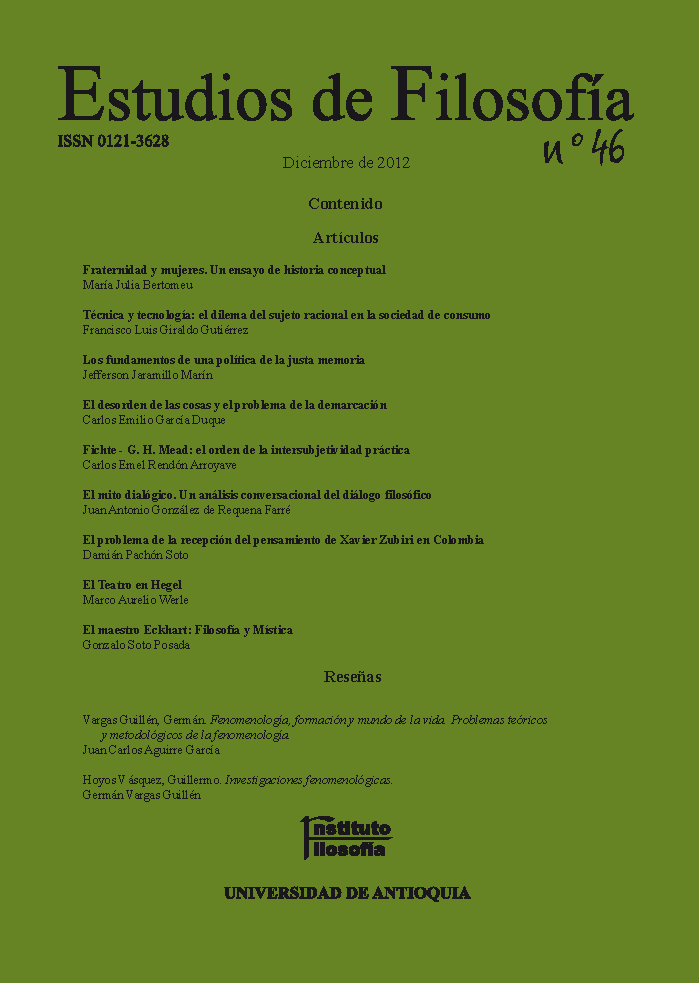Fraternity and Women. An Essay in Conceptual History
DOI:
https://doi.org/10.17533/udea.ef.14757Keywords:
Fraternity, Women, Contractualism.Abstract
In the revolutionary sense that it had in the French Triad, Fraternity is today an eclipsed value, as I attempt to show. In this paper I am particularly interested in researching the causes of the abandonment of the political value of fraternity in much of contemporary feminist political thought, though not exclusively in the Anglo-Saxon world. As I argue, this abandonment or rejection is partly a result of the general eclipse of the concept, and especially of the abandonment of the emancipatory nature of the Revolutionary Triad, but that it also has its own roots, as I try to prove.
Downloads
References
AGRA ROMERO, M.X. (1994) “Fraternidad. (Un concepto político a debate)”, en: Revista Internacional de Filosofía Política, 3, pp. 143-163.
ANÓNIMO. (1973) “Freiheitsgebet eines Jakobiner”, en: Grab, Walter y Friesel, Uwe (ed.). Noch ist Deutschland nicht verloren: eine histor-polit. Analyse unterdrückter Lyrik von der Französischen Revolution bis zur Reichsgründung, Munich, Deutscher Taschenbuch-Verlag.
ARNEILL, B. (1999) Politics and Feminism, Gran Bretaña, Blackwell.
Arneil B. (2000) “Women as Wives, Servants and Slaves: Rethinking the Public/Private Divide”, en: Canadian Journal of Political Science, vol. XXXIV (I), pp. 29-54. DOI: https://doi.org/10.1017/S0008423901777803
BERTOMEU, M.J. y Domènech, A. (2007) “Público y Privado. Republicanismo y feminismo actual”, en: Viejo Topo, Barcelona, vol. 231, pp. 95-99.
CIRIZA, A. (ed.) (2008) Intervenciones sobre ciudadanía de mujeres, política y memoria. Perspectivas subalternas, Buenos Aires, Feminaria.
CLAWSON, M.A. (1986) “Nineteenth-Century Women's Auxiliars and DOI: https://doi.org/10.1086/494296
Fraternal Orders”, en: Signs, vol. 12 (I), pp. 40-61.
DE BEAUVOIR, S. (1981) El segundo sexo, Pablo Palat (trad.), Buenos Aires, Siglo Veinte.
DESSAN, S. (2004) The family on Trial in Revolutionary France, California, University of California Press.
DOMÈNECH, A. (2004) El eclipse de la fraternidad, Barcelona, Crítica.
EHRENREICH, B. (1979) For Her Own Good. 150 Years of the Experts ́ Advice to Women, New York, An Anchor Press Book. DOI: https://doi.org/10.1097/00005721-197911000-00014
FEDERICI, S. (2004) Caliban and the Witch: Women the Body and Primitive Accumulation, Nueva York, Autonomedia. (Versión castellana: Federici, S. (2010) Calibán y la bruja. Mujeres cuerpo y acumulación primitiva, Madrid, Traficantes de Sueños).
FEDERICI, S. (2009) “On capitalism, colonialism, women and food politics”, en: Politics and Culture, Special issue on food & sovereignity, vol. 2.
GARBER, J. (1996) “Die politische Literatur des gegenrevolutionären Frühkonservatismus”, en: Zmegac, Viktor (ed.). Geschichte der deutschen Literatur von 18 Jahrhundert bis zur Gegenwart, Weinheim, Athenäum Verlag.
LANDES, J.B. (1988) Women and the Public Sphere. In the Age of the French Revolution, Ithaca, Comell University Press.
LINEBAUGH, P. (2008) The Magna Carta Manifesto, Berkeley, University California Press. DOI: https://doi.org/10.1525/9780520932708
LOCKE, J. (1973) Two Treatises of Government, Londres, Everyman Paperback.
MEIKSINS WOOD, E. (2002) The origin of capitalism: a longer view, London, Verso.
MUNDÓ, J. (2005) “Autopropiedad, derechos y libertad. ¿Debería estar permitido que uno pudiera tratarse a sí mismo como a un esclavo?”, en: Bertomeu, M.J. et. al. (comps), Republicanismo y democracia, Buenos Aires-Madrid, Miño y Dávila, pp. 187-208.
OKIN, S. (1989) Justice, Gender and family, New York, Basic Books.
PATEMAN, C. (1980) “Women and Consent”, en: Political Theory, vol. 8, (2), pp.149-168. DOI: https://doi.org/10.1177/009059178000800202
PATEMAN, C. (1983) The sexual contract, Oxford, Polity Press.
PATEMAN, C. (1989) “The fraternal social contract”, en: Pateman, C. Disorder of Woman, Standford, Stadford Universit Press.
PATEMAN, C. (2002) “Selfownership and the Property in the Person. Democratization and a Tale of Two Concepts”, en: Journal of Political Philosophy, vol. 10 (1), pp. 20-53. DOI: https://doi.org/10.1111/1467-9760.00141
PHILLIPS, A. (2000) “Survey Article: Feminism and Republicanism: Is this a Possible Alliance?”, en: The Journal of Political Philosophy, vol. 8 (2), pp. 279-293. DOI: https://doi.org/10.1111/1467-9760.00103
VEGA, J. (1989) “Feminist Republicanism. Etta Palm-Aelders on Justice, Virtue and Men”, en: History of European Ideas, vol. 10 (3), pp. 333-351. DOI: https://doi.org/10.1016/0191-6599(89)90132-0
SHANLEY, M. (1979) “Contract marriage and social contract in Seventeenth Century Political Thought”, en: The Western Political Quaterly, 32, pp. 79-91. DOI: https://doi.org/10.1177/106591297903200108
Downloads
Published
How to Cite
Issue
Section
Categories
License
Copyright (c) 2012 María Julia Bertomeu

This work is licensed under a Creative Commons Attribution-NonCommercial-ShareAlike 4.0 International License.
Authors who publish with this journal agree to the following terms:
1. The Author retains copyright in the Work, where the term "Work" shall include all digital objects that may result in subsequent electronic publication or distribution.
2. Upon acceptance of the Work, the author shall grant to the Publisher the right of first publication of the Work.
3. The Author shall grant to the Publisher a nonexclusive perpetual right and license to publish, archive, and make accessible the Work in whole or in part in all forms of media now or hereafter known under a Creative Commons Attribution-NoCommercia-ShareAlike (CC BY-NC-SA 4.0), or its equivalent, which, for the avoidance of doubt, allows others to copy, distribute, and transmit the Work under the following conditions: (a) Attribution: Other users must attribute the Work in the manner specified by the author as indicated on the journal Web site;(b) Noncommercial: Other users (including Publisher) may not use this Work for commercial purposes;
4. The Author is able to enter into separate, additional contractual arrangements for the nonexclusive distribution of the journal's published version of the Work (e.g., post it to an institutional repository or publish it in a book), as long as there is provided in the document an acknowledgement of its initial publication in this journal;
5. Authors are permitted, and Estudios de Filosofía promotes, to post online the preprint manuscript of the Work in institutional repositories or on their Websites prior to and during the submission process, as it can lead to productive exchanges, as well as earlier and greater citation of published work (see The Effect of Open Access). Any such posting made before acceptance and publication of the Work is expected be updated upon publication to include a reference to the Estudios de Filosofía's assigned URL to the Article and its final published version in Estudios de Filosofía.















